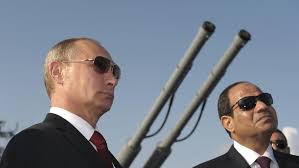Its Growing Economic and Military Influence in the Regin With the world’s attention focused on the question of Russian influence in the United States and the European Union, the Kremlin is quietly making inroads in another region critical to both the United States and Europe: the five North African states of the southern Mediterranean shore.
Russian and Algerian officials gathered at a St. Petersburg shipyard last month to shatter a champagne bottle on the first of two so-called Black Hole submarines built for the Algerian navy. The same day, news broke that Russia had deployed special forces and drones to a Soviet-era base in western Egypt to bolster a militia leader in neighboring Libya. Late last year, the secretary of Moscow’s national security council traveled to Morocco, where the king invited Russian President Vladimir Putin to repay the visit he had made to Moscow earlier in the year. And in Tunisia, where Russian tourism jumped tenfold in 2016, the Kremlin signed a deal last autumn to build a nuclear power plant.
Egypt, the world’s largest Arab state, was the jewel in the Soviets’ Middle East crown until it defected to the U.S. camp in the late 1970s, serving as Washington’s most important North African ally ever since. Cairo, however, began systematically expanding its ties with Russia soon after General Abdel Fattah el-Sisi overthrew President Mohamed Morsi in 2013. The administration of Barack Obama, wary of Cairo’s heavy-handed tactics to stamp out dissent, kept some distance from Sisi, who then turned to Russia to help fill the void. In 2015, Putin traveled to Cairo, where the streets were lined with banners bearing his image, and he returned the favor by presenting Sisi with a new Kalashnikov.
In October 2016, Egypt voted with Russia against a UN Security Council resolution that sought to end air strikes in Syria—a vote denounced across the Arab world as a bid to curry favor with Moscow. Weeks later, the two nations held their first-ever joint military drill, which they named Defenders of Friendship.

